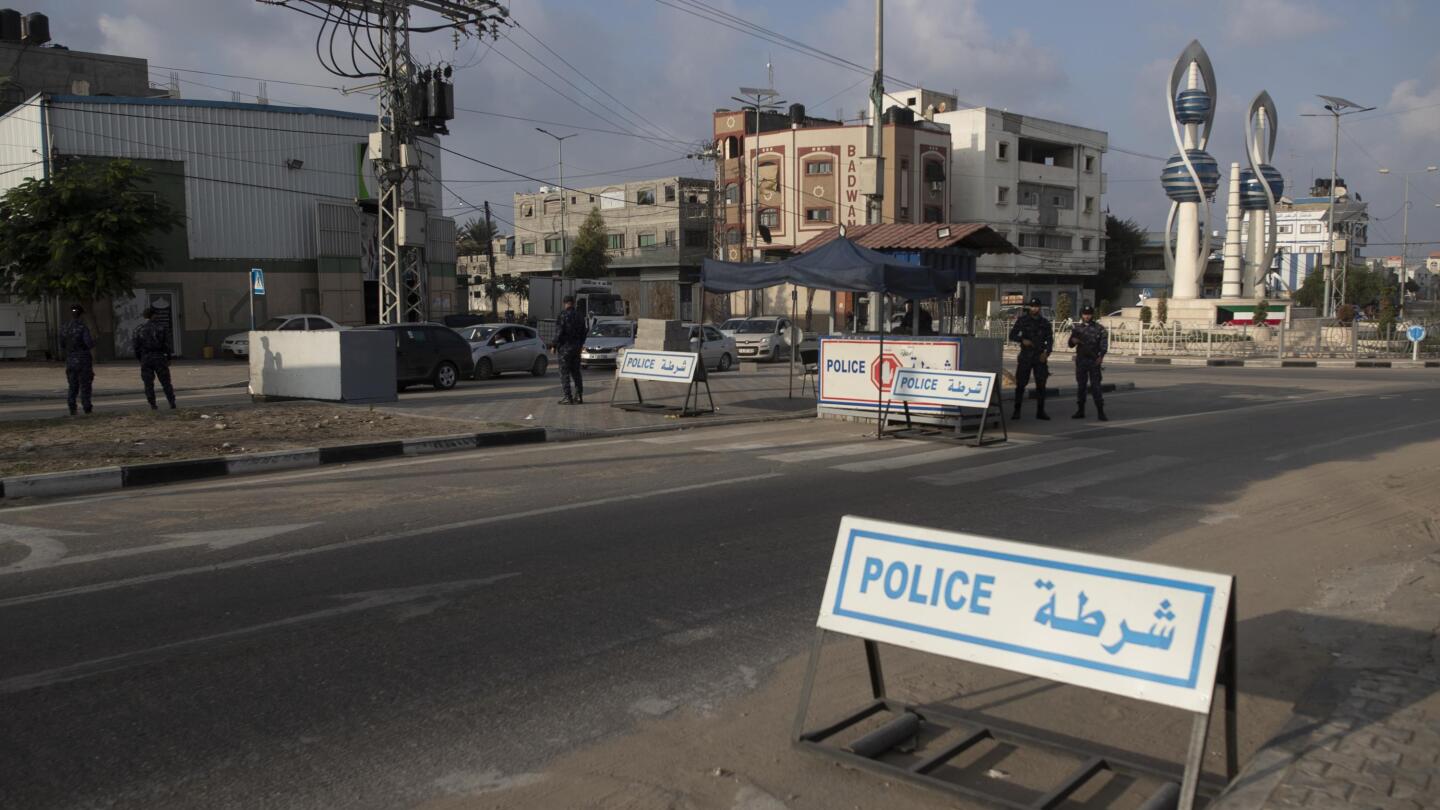Daoud Kuttab, a Palestinian journalist, is a former Ferris Professor of Journalism at Princeton University.
What happened in Israel on Saturday should not have surprised anyone.
Palestinian officials had repeatedly spoken of an explosion if there was no political progress on alleviating their people’s suffering. Addressing the U.N. General Assembly, King Abdullah II of Jordan said, “Without clarity on where the Palestinians’ future lies, it will be impossible to converge on a political solution to this conflict. Five million Palestinians live under occupation — no civil rights; no freedom of mobility; no say in their lives.” And recently, Egyptian intelligence had reportedly warned Israel of a catastrophe unless there was political progress.
Palestinian leaders, Jordan’s king and Egyptian officials knew that without hope, something would give.
The late Israeli president Shimon Peres used to quote an Arabic proverb: Fil haraka baraka — there is a blessing in movement. Unfortunately, there has been no movement on the political front for years. The last public talks between Israelis and Palestinians ended in 2014, and at the time, U.S. Secretary of State John F. Kerry put the blame on the Israelis for their suspension.
Since then, no talks have taken place, even while three U.S. presidents — Barack Obama, Donald Trump and Joe Biden — have invoked the empty mantra of a two-state solution.
This absence of a political process was compounded by the recent stoking of religious tensions. Three days before the Hamas attack, Jordan, the recognized custodian of the holy places in Jerusalem, sent a letter to the Israeli Embassy in Amman protesting the fact that Jewish “visitors” had begun praying loudly on the grounds of the al-Aqsa Mosque. At the same time, Israeli police imposed an age restriction preventing young Palestinian Muslim men from entering the mosque itself. While secular Palestinian leaders might be open to a political compromise, religious leaders are much less flexible when matters of faith are in question.
Israeli Jewish nationalists were upending a carefully orchestrated status quo agreement on Muslim holy sites, and their actions have hurt the Christian community in Jerusalem, as well. Last month in Rome, the Latin patriarch of Jerusalem, Cardinal Pierbattista Pizzaballa, raised the situation with Pope Francis and mentioned it in news conferences and during his first homily. He even said that Gaza was an “open prison” — a statement that angered Israelis who have been blindly complacent for so long that they were unable to hear advice even from their friends.
The carefully planned attacks on Saturday produced atrocities that cannot be denied or justified. No righteous cause excuses the slaughter of innocents on the other side. But they also revealed a basic truth: People always want to be free of occupation and of colonial foreign settlements on their land.
Palestinians have been unable to liberate their land using political means. Negotiation efforts by Mahmoud Abbas, president of the secular Palestinian Authority, have come up empty, as has nonviolent activism to boycott Israel. As a result, religious Palestinians have been left with little choice but to attempt to address their own people’s oppression.
There is no mystery about what must happen next. Even though it is lower than before, support for the two-state solution among both Israelis and Palestinians is higher than for any other alternative. But having a Palestinian state alongside the state of Israel requires recognition by the United Nations. The United States has repeatedly wielded its veto against the very same issue to which it pays lip service.
As soon as the violence ebbs, President Biden should courageously recognize an independent and democratic Palestinian state living in peace side by side with a secure Israel. Such a move would need no congressional blessing. Once a Palestinian state under occupation is recognized by the U.N. Security Council, productive talks between representatives of the state of Israel and representatives of the state of Palestine can then begin in earnest.
This kind of proposal might seem fanciful at the moment, but there is no other way forward.
What happened in Israel on Saturday should not have surprised anyone.
Palestinian officials had repeatedly spoken of an explosion if there was no political progress on alleviating their people’s suffering. Addressing the U.N. General Assembly, King Abdullah II of Jordan said, “Without clarity on where the Palestinians’ future lies, it will be impossible to converge on a political solution to this conflict. Five million Palestinians live under occupation — no civil rights; no freedom of mobility; no say in their lives.” And recently, Egyptian intelligence had reportedly warned Israel of a catastrophe unless there was political progress.
Palestinian leaders, Jordan’s king and Egyptian officials knew that without hope, something would give.
The late Israeli president Shimon Peres used to quote an Arabic proverb: Fil haraka baraka — there is a blessing in movement. Unfortunately, there has been no movement on the political front for years. The last public talks between Israelis and Palestinians ended in 2014, and at the time, U.S. Secretary of State John F. Kerry put the blame on the Israelis for their suspension.
Since then, no talks have taken place, even while three U.S. presidents — Barack Obama, Donald Trump and Joe Biden — have invoked the empty mantra of a two-state solution.
This absence of a political process was compounded by the recent stoking of religious tensions. Three days before the Hamas attack, Jordan, the recognized custodian of the holy places in Jerusalem, sent a letter to the Israeli Embassy in Amman protesting the fact that Jewish “visitors” had begun praying loudly on the grounds of the al-Aqsa Mosque. At the same time, Israeli police imposed an age restriction preventing young Palestinian Muslim men from entering the mosque itself. While secular Palestinian leaders might be open to a political compromise, religious leaders are much less flexible when matters of faith are in question.
Israeli Jewish nationalists were upending a carefully orchestrated status quo agreement on Muslim holy sites, and their actions have hurt the Christian community in Jerusalem, as well. Last month in Rome, the Latin patriarch of Jerusalem, Cardinal Pierbattista Pizzaballa, raised the situation with Pope Francis and mentioned it in news conferences and during his first homily. He even said that Gaza was an “open prison” — a statement that angered Israelis who have been blindly complacent for so long that they were unable to hear advice even from their friends.
The carefully planned attacks on Saturday produced atrocities that cannot be denied or justified. No righteous cause excuses the slaughter of innocents on the other side. But they also revealed a basic truth: People always want to be free of occupation and of colonial foreign settlements on their land.
Palestinians have been unable to liberate their land using political means. Negotiation efforts by Mahmoud Abbas, president of the secular Palestinian Authority, have come up empty, as has nonviolent activism to boycott Israel. As a result, religious Palestinians have been left with little choice but to attempt to address their own people’s oppression.
There is no mystery about what must happen next. Even though it is lower than before, support for the two-state solution among both Israelis and Palestinians is higher than for any other alternative. But having a Palestinian state alongside the state of Israel requires recognition by the United Nations. The United States has repeatedly wielded its veto against the very same issue to which it pays lip service.
As soon as the violence ebbs, President Biden should courageously recognize an independent and democratic Palestinian state living in peace side by side with a secure Israel. Such a move would need no congressional blessing. Once a Palestinian state under occupation is recognized by the U.N. Security Council, productive talks between representatives of the state of Israel and representatives of the state of Palestine can then begin in earnest.
This kind of proposal might seem fanciful at the moment, but there is no other way forward.




